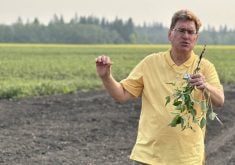ALTONA, Man. – Yorkton’s twin sisters have been getting all the press for years, but Bunge’s oilseed crushing plant in southeastern Manitoba has jumped into the spotlight, with the company announcing plans to double production.
That will make it the canola crushing equivalent of each of the plants in Yorkton.
And the Altona plant expansion is just the start of what Bunge says will be a boosting of its production at plants across the Prairies.
It’s great news for farmers, said Bruce Dalgarno, a Newdale farmer.
Read Also

Key actions identified to address canola tariffs
Federal and Saskatchewan governments discuss next steps with industry on Chinese tariffs
“The more competition, the more product they need to put through there (in Altona), the more it’ll help the basis,” said Dalgarno.
“It’s a huge benefit to the eastern side of the Prairies. We have two new plants in Yorkton, and we have this big one at Harrowby, and now we’re going to double the one at Altona.”
Altona’s crush capacity will rise to 2,500 tonnes a day from 1,100 tonnes and a deodorizer will be added. Bunge hopes to have the new capacity ready for harvest 2012.
It also plans to expand its plants in Nipawin, Sask., Harrowby, Man., and Fort Saskatchewan, Alta.
When the Louis Dreyfus and Richardson plants were almost simultaneously announced for Yorkton, many wondered whether the new operations would be able to find enough canola to stay busy. The companies were confident they could, but many were skeptical and warned of crush overcapacity.
Bunge’s announcement suggests that the crushers’ confidence may have been well founded.
“Yields are going up every year. What these seed breeders are doing with these crops is amazing,” said one crushing company manager who did not want to be identified.
“It’s big increases. Farmers love it. It can get rained on and snowed on (and it still produces a good crop). It’s getting everything that wheat’s missing out on.”
In a news release, Bunge Canadian country manager Rick Watson said rising production around Altona tailored its plans.
“Canola is an attractive crop to the Canadian farmer, and both acreage and yields will increase, especially around Altona, making it a logical first place to expand our Canadian operations,” he said.
The prairie crushing industry had experienced years of losses and stagnation, especially in the early 2000s when drought-reduced crops had plants working below capacity. But once the drought years passed, the potential of hybrid canola with the newest genetics leapt forward, with crops exceeding expectations.
Farmers rely on a combination of domestic crushing and export sales of seed to clear the crop from the Prairies. The stronger the demand, the better prices tend to be. The stronger the on-prairie demand from elevators and crushers, the better the basis tends to be.

















